Composer Hermann Wolfgang von WALTERSHAUSEN (1882-1954): Letters MUNICH 1925/26
Description
– See more pictures below! –
They bid on five signed letters of Composers, conductors, music educators and music writersstellers Hermann Wolfgang von Waltershausen (1882-1954).
Dated Munich 1925/26.
Regards a planned performance of his work "Apocalyptic Symphony in C minor, Op. 20" in Konigsberg, which then doesn't come about.
"In the 1920s, Waltershausen turned to composing large orchestral works, of which the Apocalyptic Symphony and nativity music received particular attention." (Source: wikipedia.)
Aimed at the pianist, composer, writer and music critic Erwin Kroll (1886-1976) in Königsberg, who worked as an editor at the local “Hartungsche Zeitung”.
1.) 2-page handwritten letter (two sheets written on one side. on thin paper, 29.5 x 22.8 cm format), dated Munich, 20. April 1925.
Excerpts: "Dear Doctor, now that I finally have the material from the Apocalyptic Symphony, which was on the road for performance purposes all winter, I was just about to send the score to Dr. Kunwald when I heard about his appointment in the newspaper Vienna read for the next season. I had secretly hoped that Kunwald would [...] invite me to come to Königsberg to manage the plant; I would have been all the more willing to accept this invitation because I feel the need to get out of Munich as much as possible, to establish new personal connections, renew old ones, and in general to make the beneficial power of fresh impressions useful to me and my work."
Is meant the Austrian lawyer, conductor, choir director and pianist Ernst Kunwald (1868-1939), who was general music director in Königsberg until 1927; It was not until 1928 that he became conductor of the Berlin Symphony Orchestra.
“You will now be in the best position to judge on the spot what needs to be done to make the performance possible even under changed circumstances.”
At the end about his upcoming concert activities, including "the premiere of my new symphony in Hamburg."
Signed "Your always devoted HW v. Waltershausen."
2.) Typewritten letter (1 ½ pages in the format 28.3 x 22.4 cm), dated Munich, 22. May 1925.
Excerpts: "If the question of my direction of the work were to fail solely because of material things, I would regret this very much."
HW von Walterhausen's aim is to show the "East Prussians sealed off by the Polish corridor" that "we don't forget them." [...] I do not claim more than reimbursement of my actual expenses. [...] I would also be happy to give a current lecture after the concert, which could perhaps make financing easier. I know that you will continue to do Allen in your power for me; If the proposed plan cannot be carried out, I will of course be extremely pleased with a performance by Kunwald or his successor."
Signed "[Your loyalty] HW v. Waltershausen."
3.) Handwritten letter (1 ½ pages on thin paper; format 29.5 x 22.8 cm), dated Grünwald / Munich, 30. July 1925.
Excerpts: "Dear Doctor, thank you very much for your kind letter and your further efforts towards the Apocalyptic Symphony. To Dr. I have written to Kunwald and am waiting for an answer from you as to where I should send him the score. I would have been particularly happy to come to Königsberg, also next winter [...]. If only it depends on money, there is a radio station in Königsberg and my radio lectures enjoy a certain degree of fame. If you could arrange for me to speak there [,.,], that would already cover part of the costs. [...]
I am very curious what you will say about my new symphony Hero and Leander. I believe it is even bolder than the apocalyptic one in terms of uniting tradition and progress. The premiere is on the 14th. October in Hamburg (under my leadership at Pabst). Can't you come?"
Signed "Your always sincerely devoted HW v. Waltershausen."
4.) Typewritten letter (one page measuring 28.3 x 22.3 cm), dated Munich, 24. September 1925.
Excerpts: "I had already heard from General Music Director Dr. Kunwald that he had included the Apocalyptic Symphony on his programs. I very much regret that the poor economic situation prevents the symphony concerts from having me as a guest conductor [...]."
Signed "[Your always devoted] HW v. Waltershausen."
5.) 2-page handwritten letter (two sheets written on one side. on thin paper, 28.3 x 22.3 cm format), dated Munich, 1. March 1926.
Excerpts: "Dear Doctor, I have now also been informed about the fate of the Apocalyptic Symphony in Königsberg, which you informed me about, through press releases and a letter from my publisher. I hope that Kunwald will make up for what he missed; Maybe you would be kind enough to suggest to him that he could perhaps do Hero and Leander instead of the Apocalyptic Symphony (playing time 27 min. Orchestra line-up normal with triple wood). The orchestral songs are also suitable where there are difficulties with the larger works. The only reason I find the Königsberg affair unpleasant is that it gives new fuel to the rumor that the Apocalyptic Symphony is extraordinarily long, difficult and demanding in terms of casting. I published the work everywhere with 2-3 rehearsals and always found recognition in the press that the performance was considered to be of particularly high quality. I knew why I would have liked to come to Königsberg myself. [...] The fact that the bad music conditions in Königsberg also threaten your existence fills me with concern [...]."
Signed "With best regards, I am your always devoted HW v. Waltershausen."
Each without an envelope.
Condition: Letters punched on the side (without loss of letters); Paper browned, slightly stained and creased, with corner creases. bPlease also note the pictures at the end of the item description!
Internal note: Kroll 2021-12-8 Autograph Autograph
Pictures
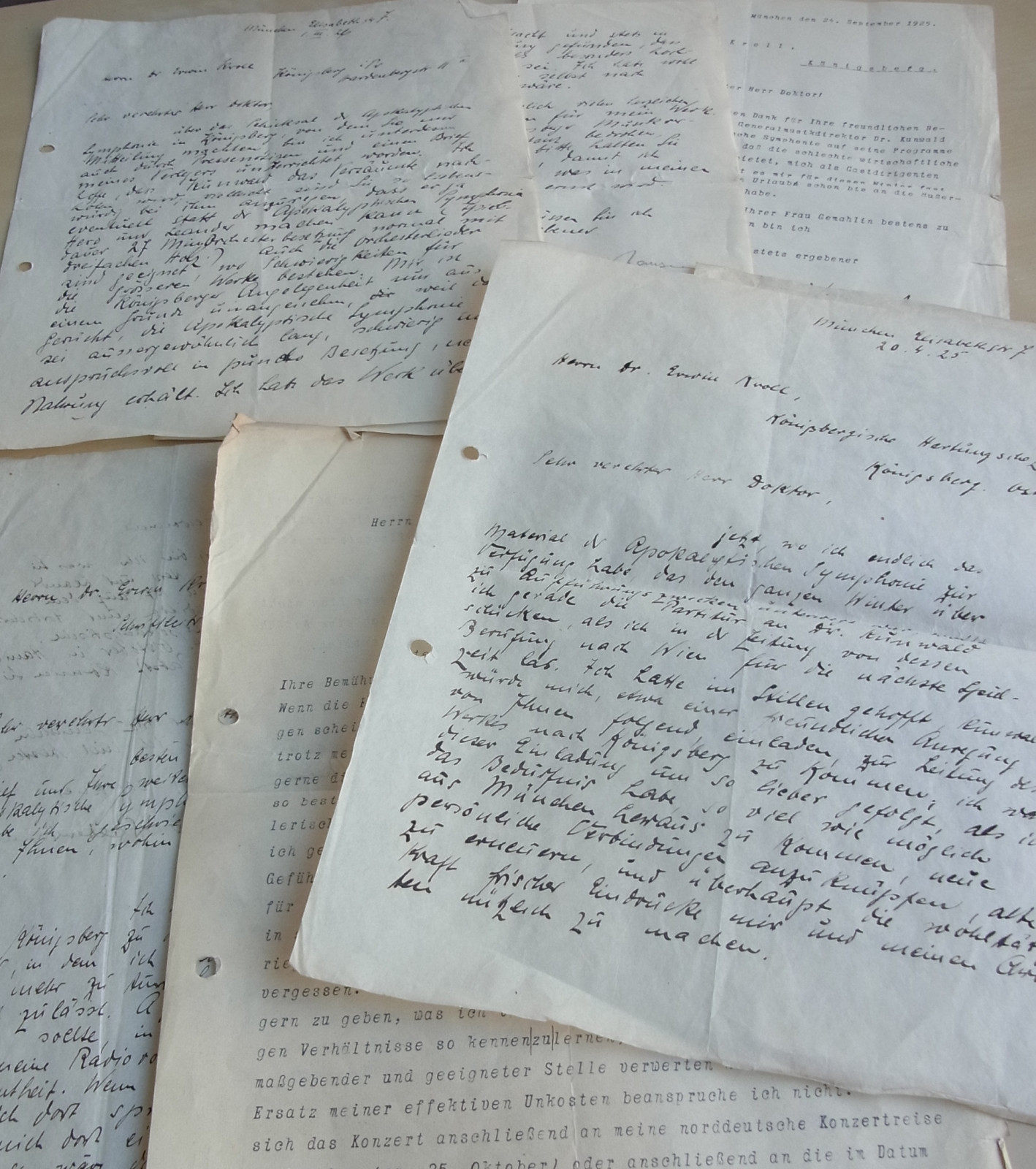
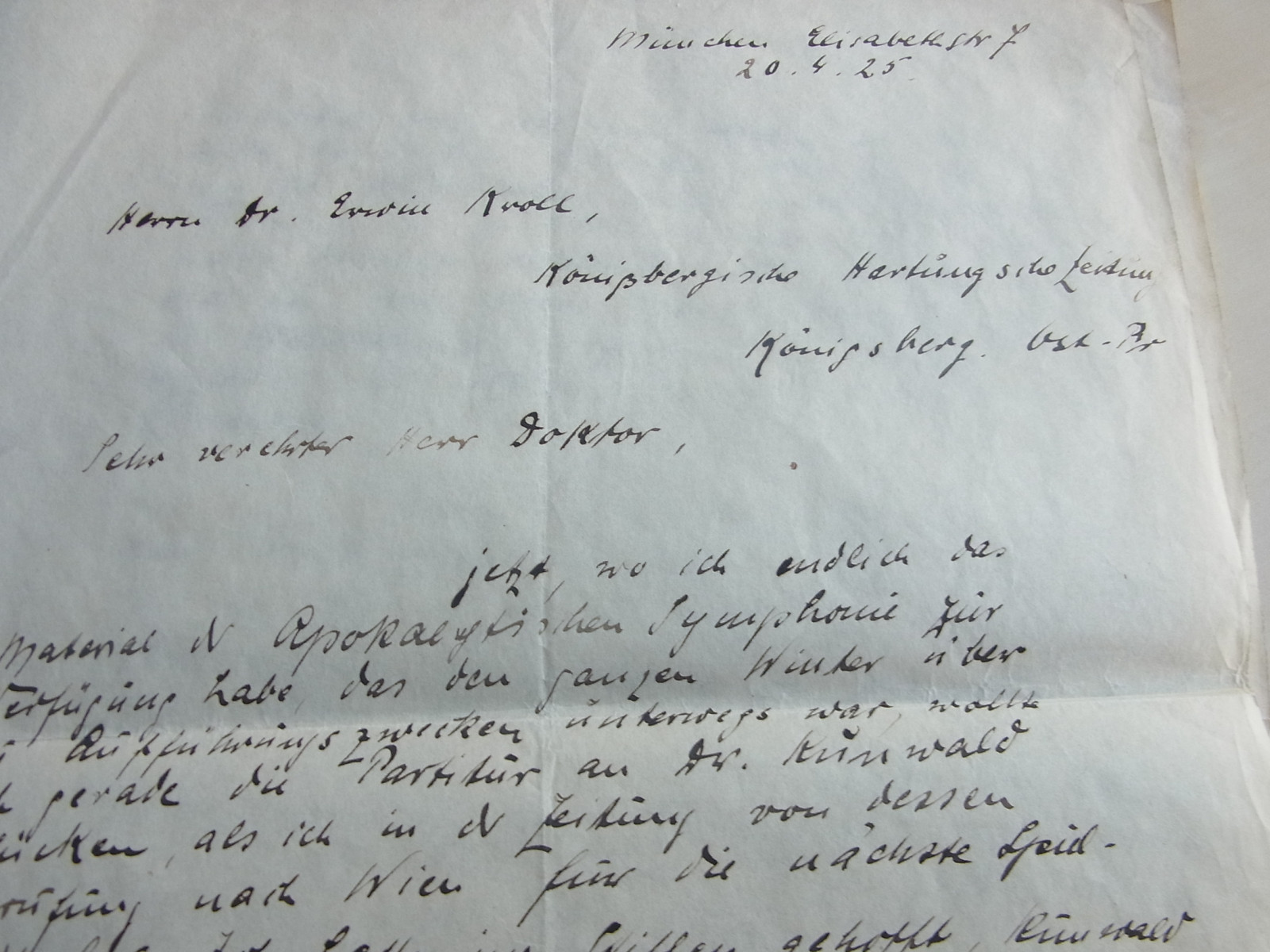
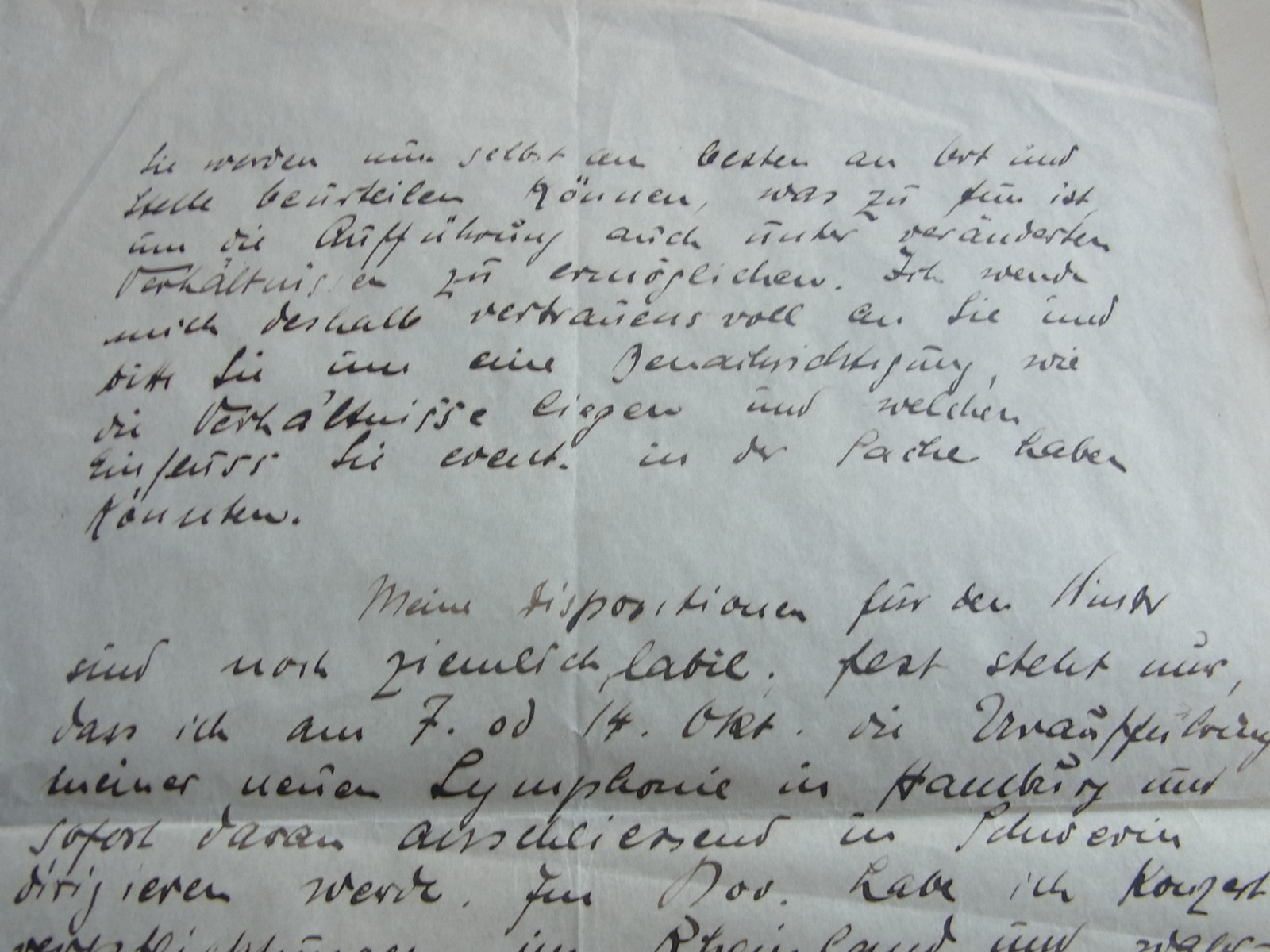
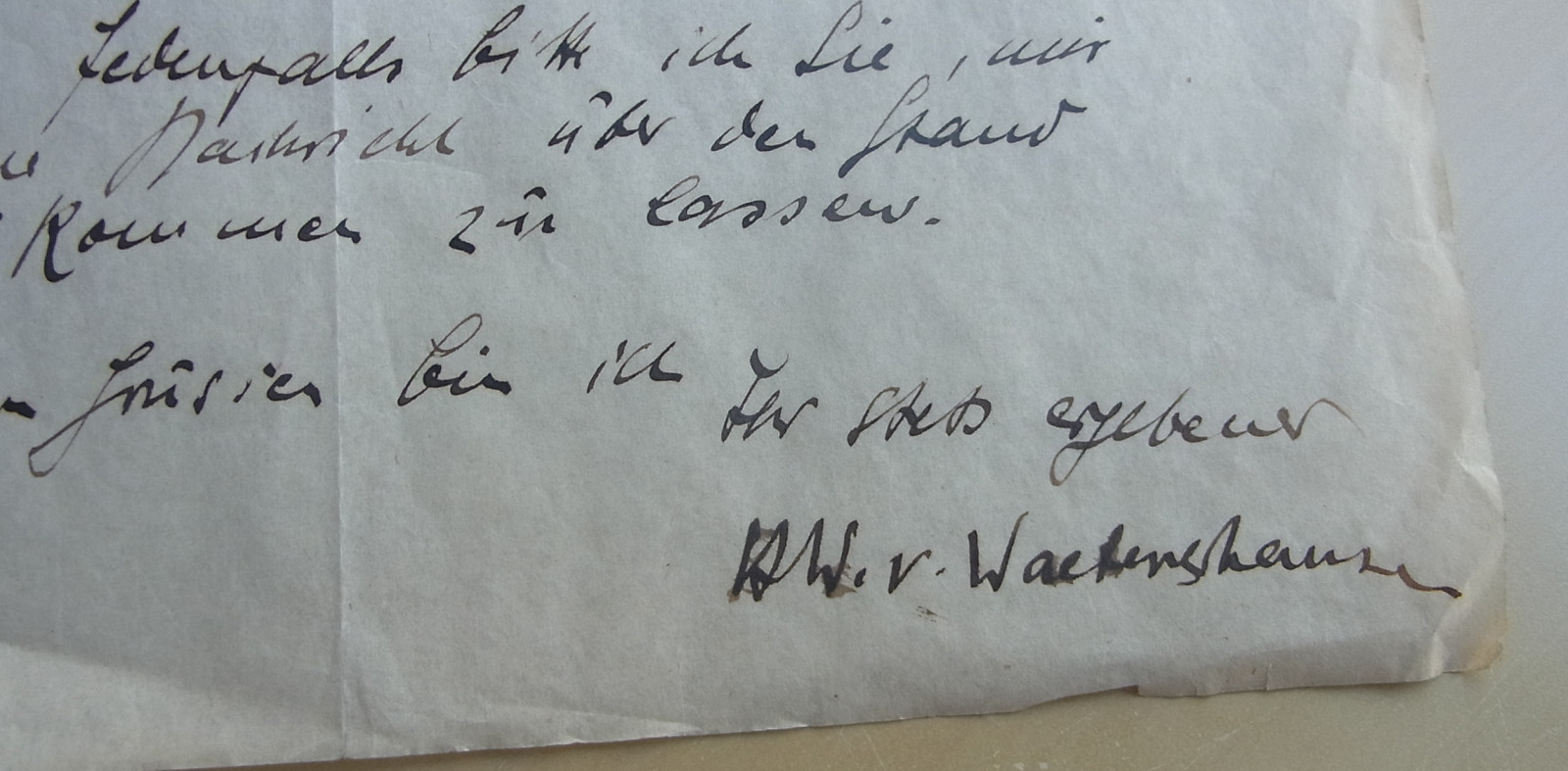
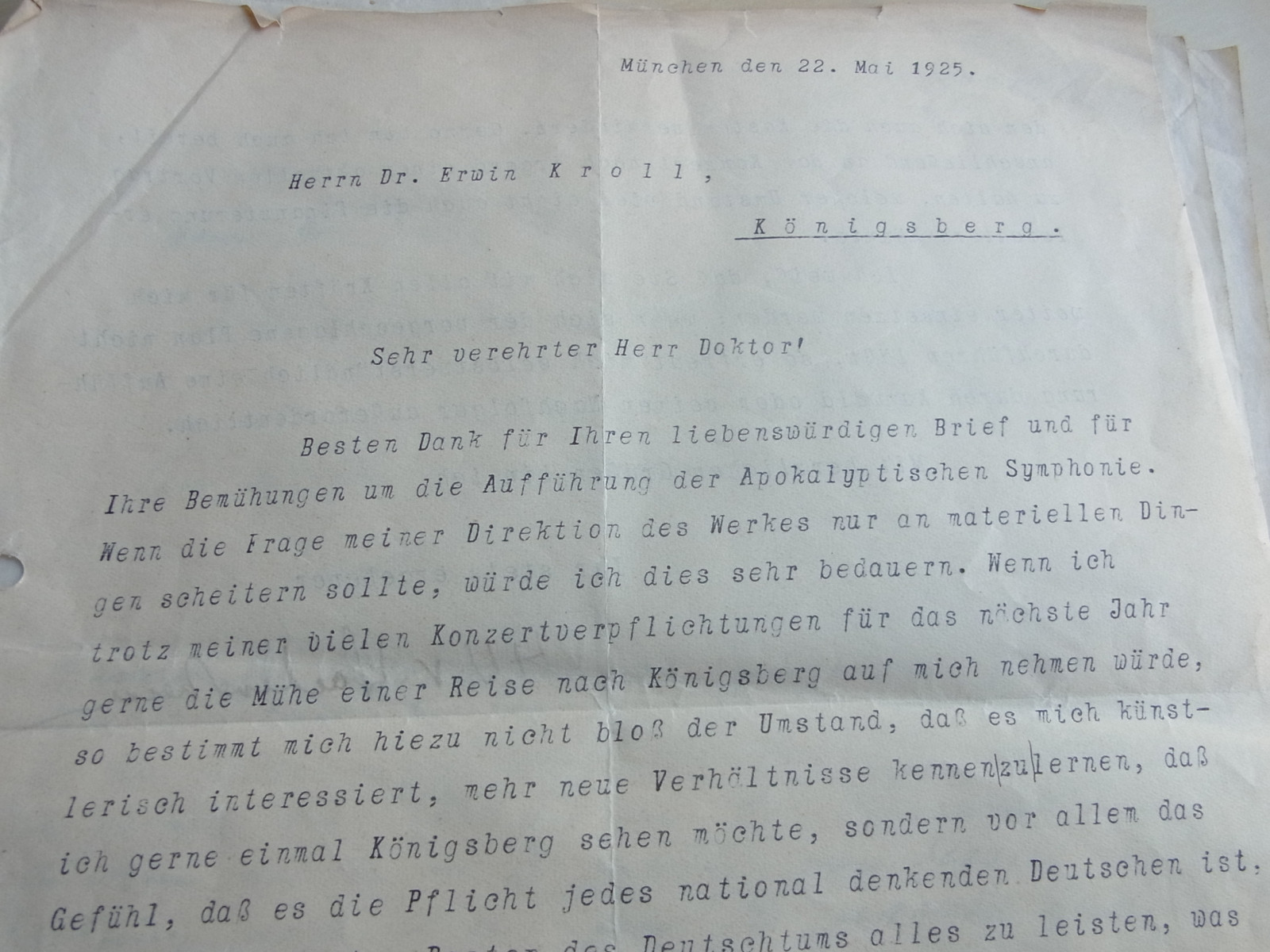
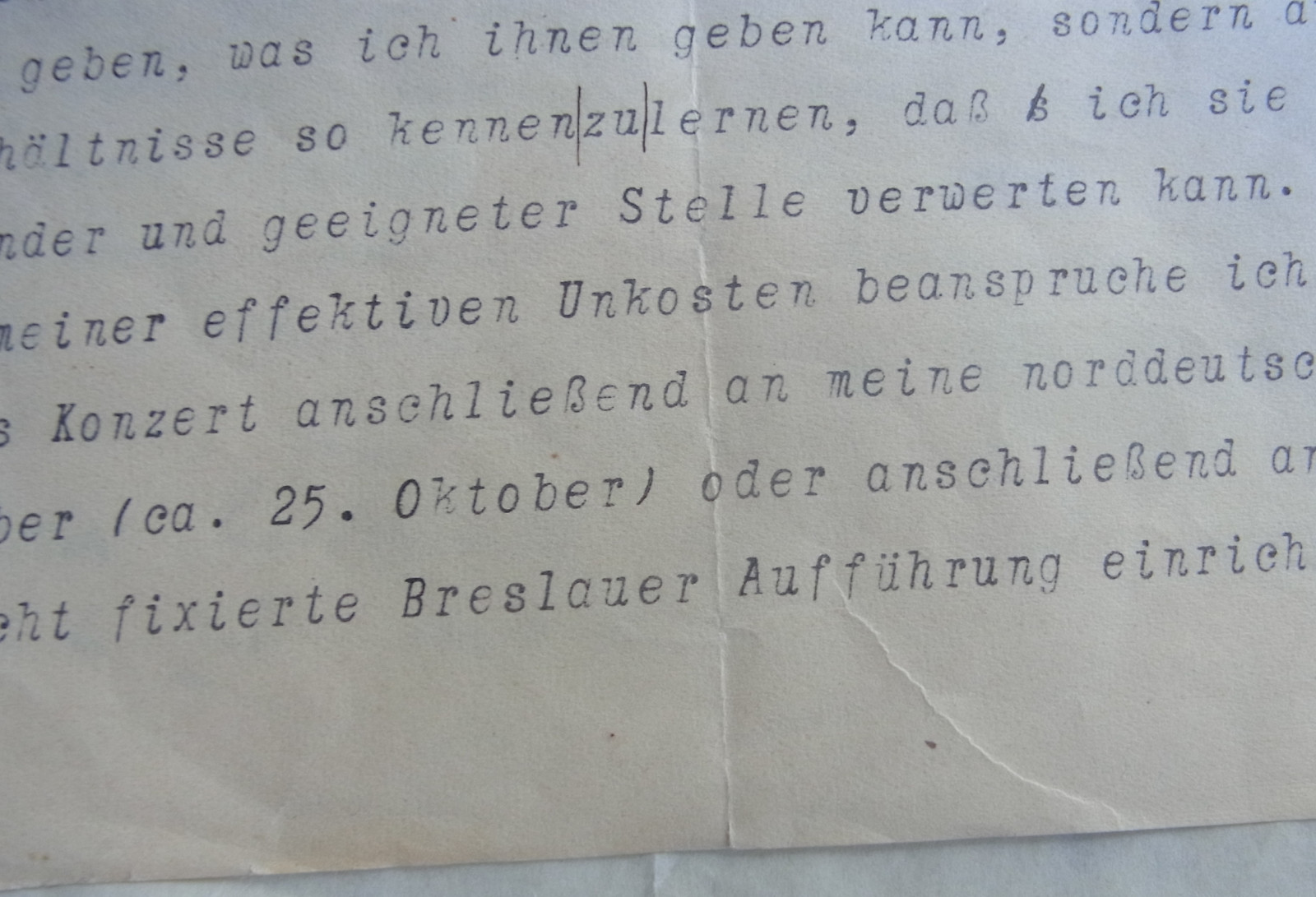
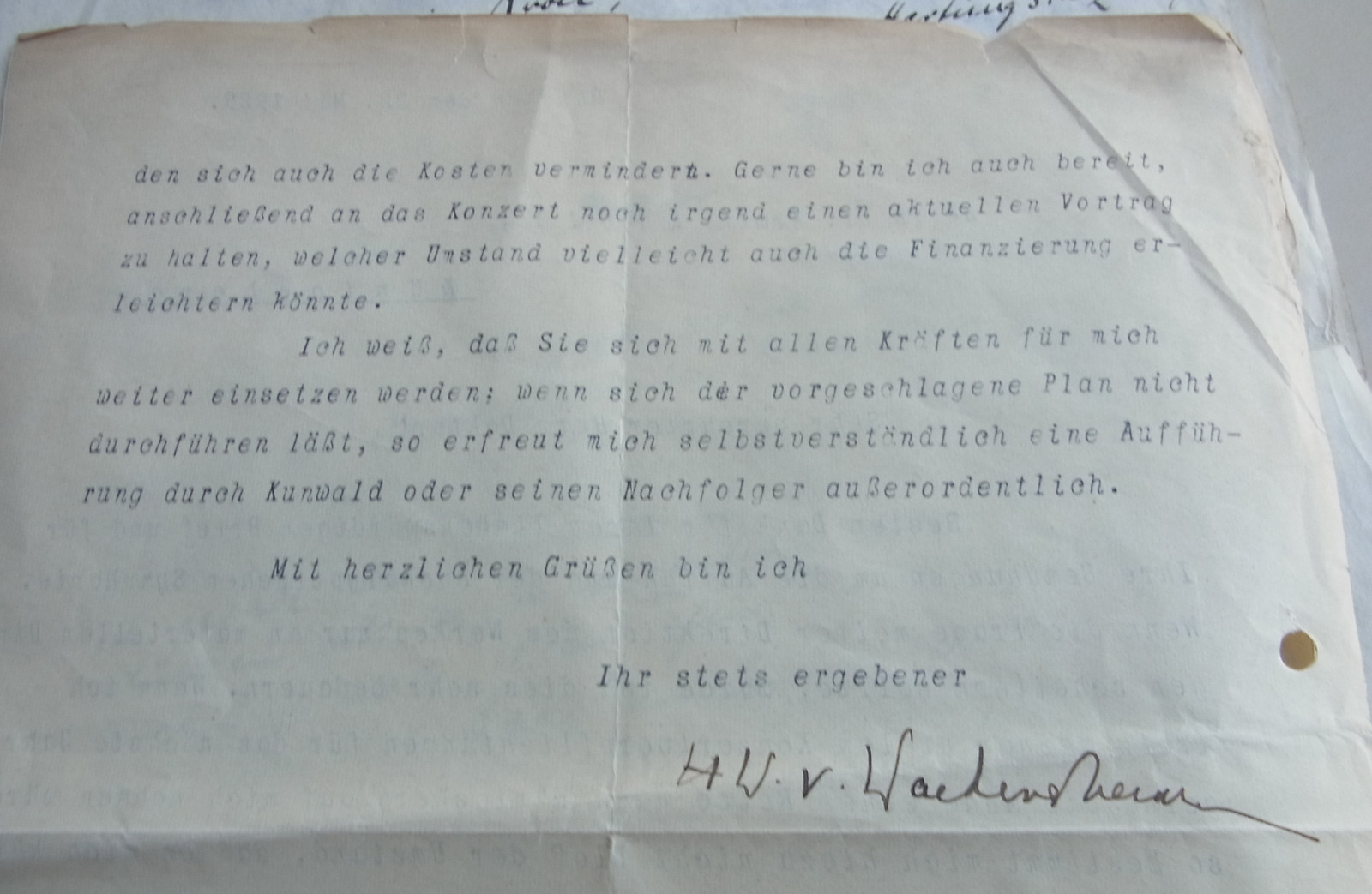

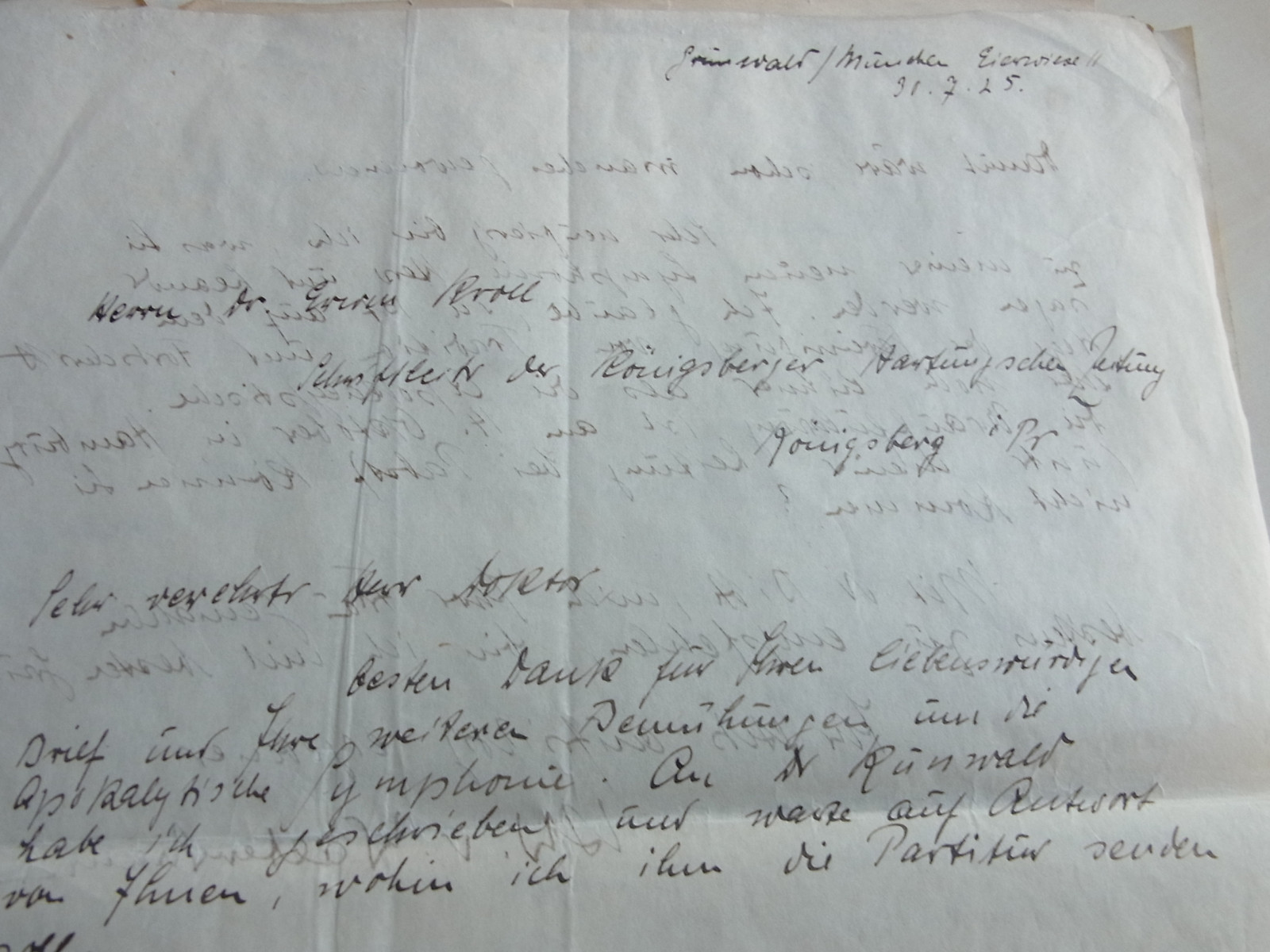
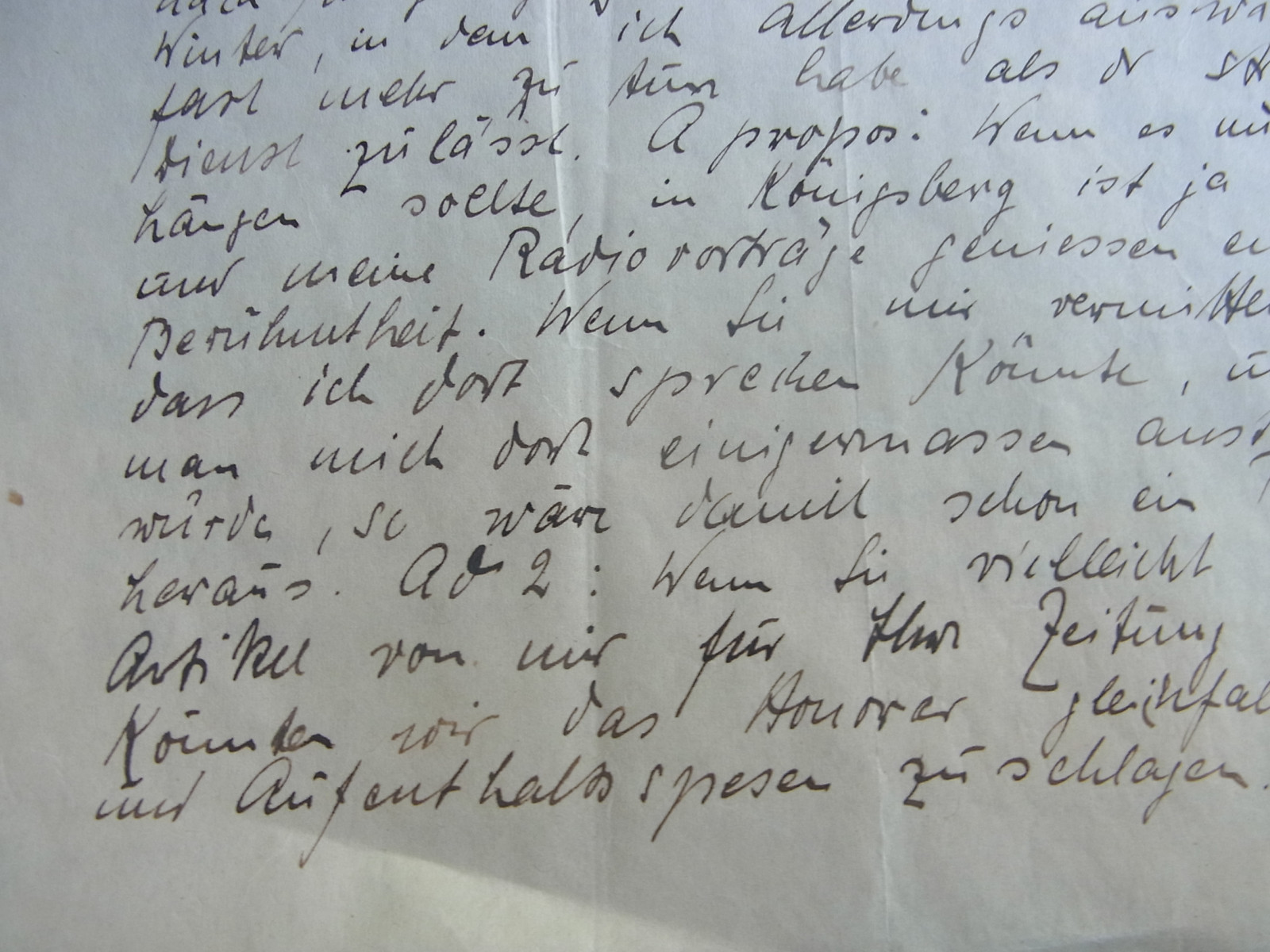
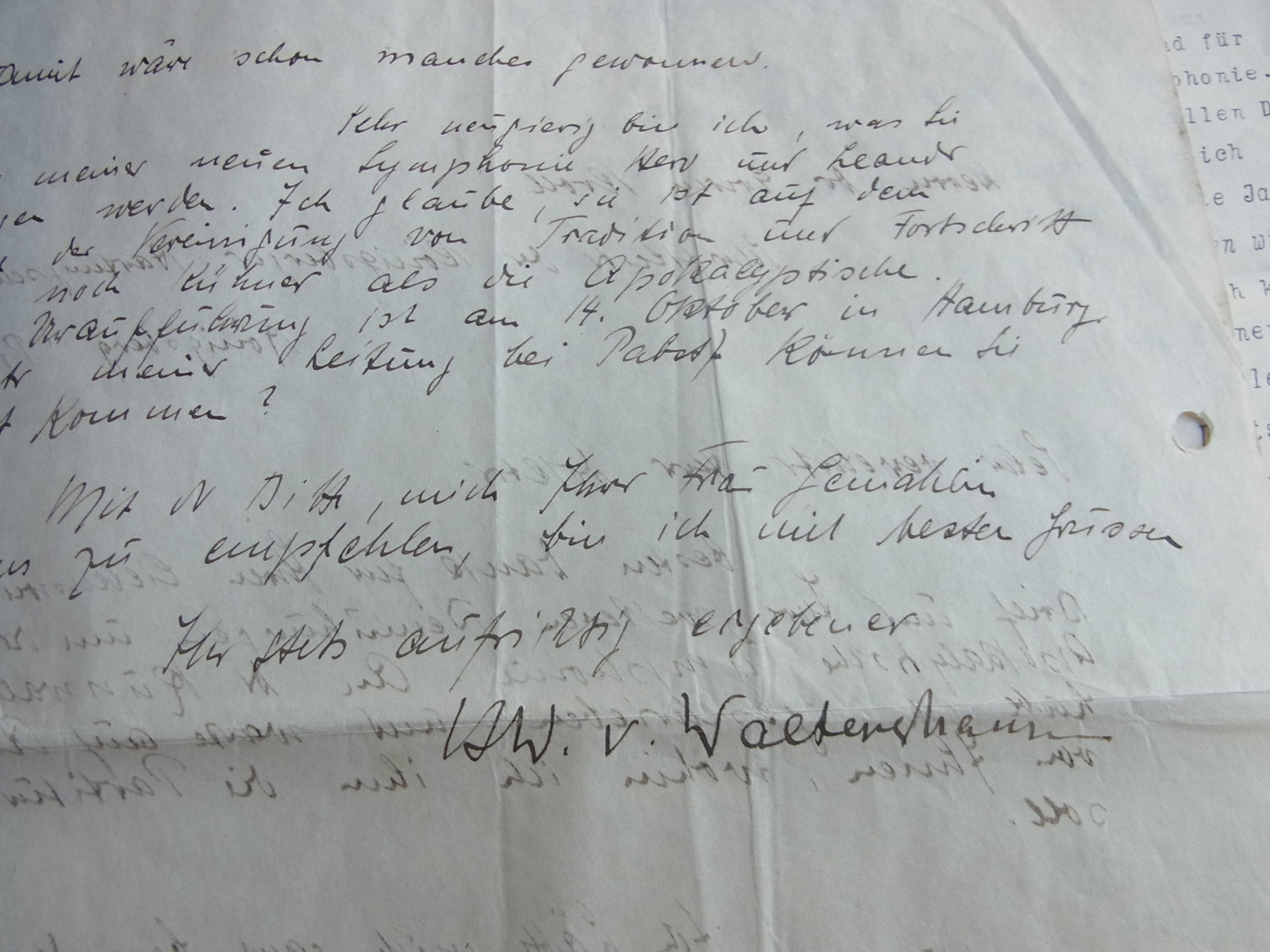
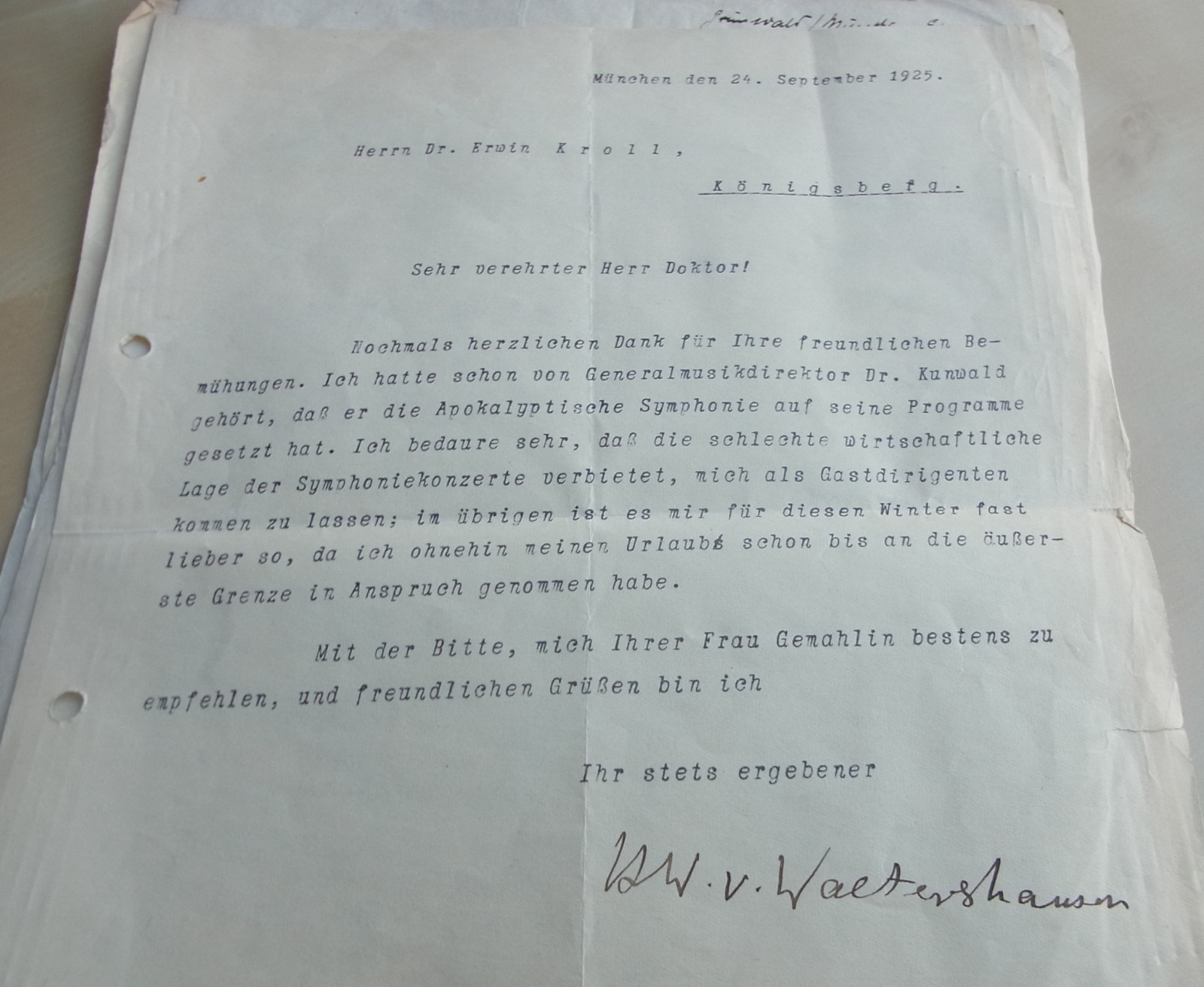
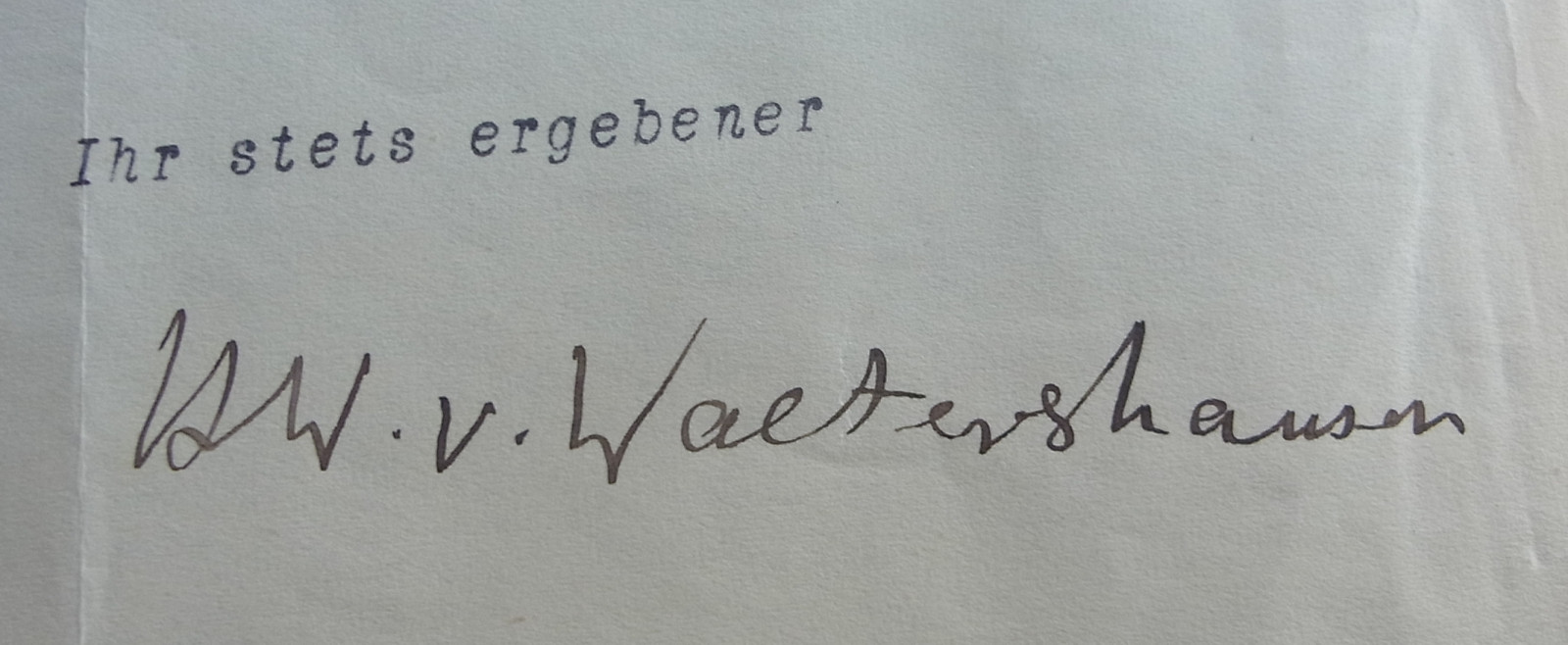
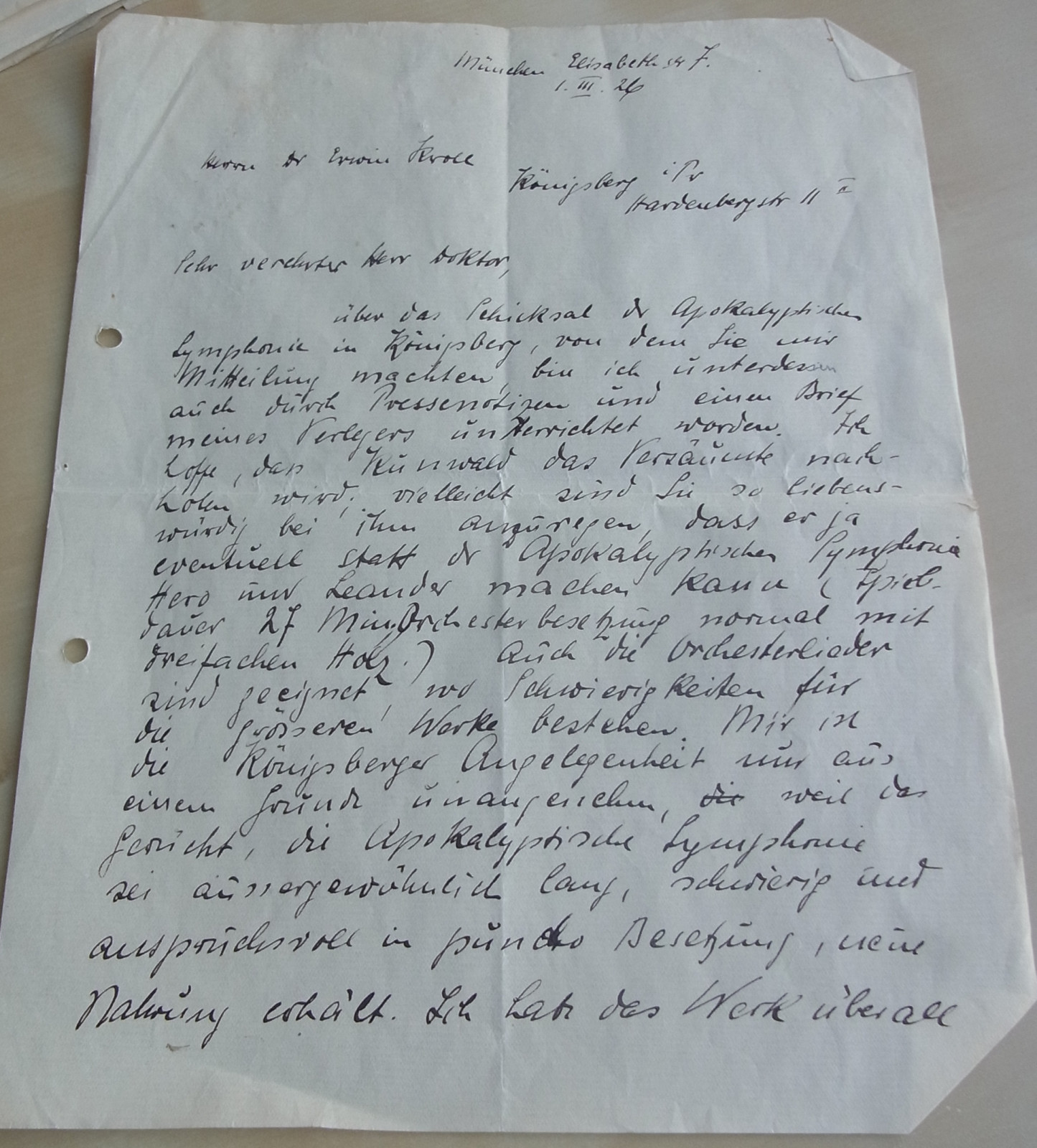
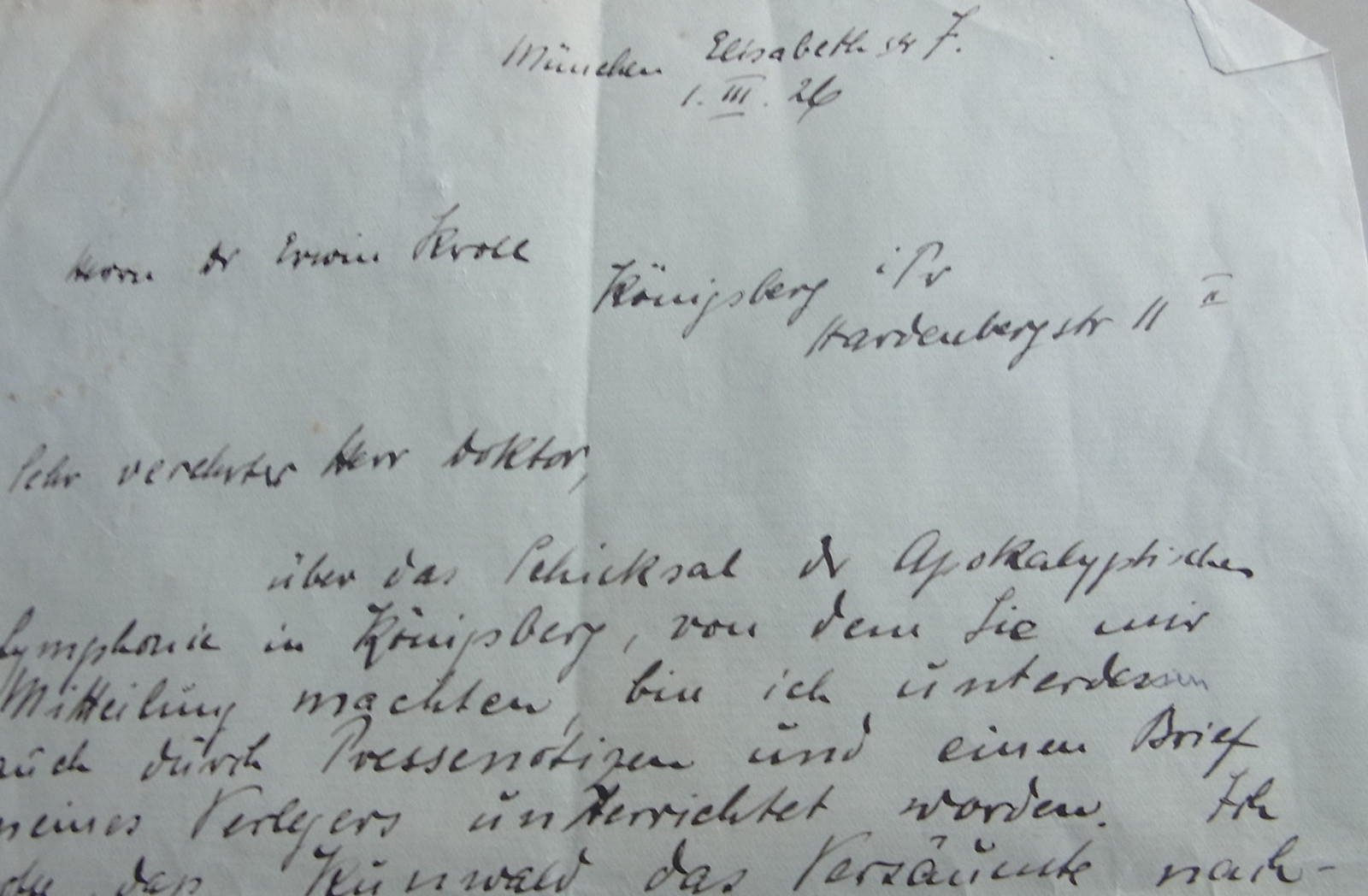
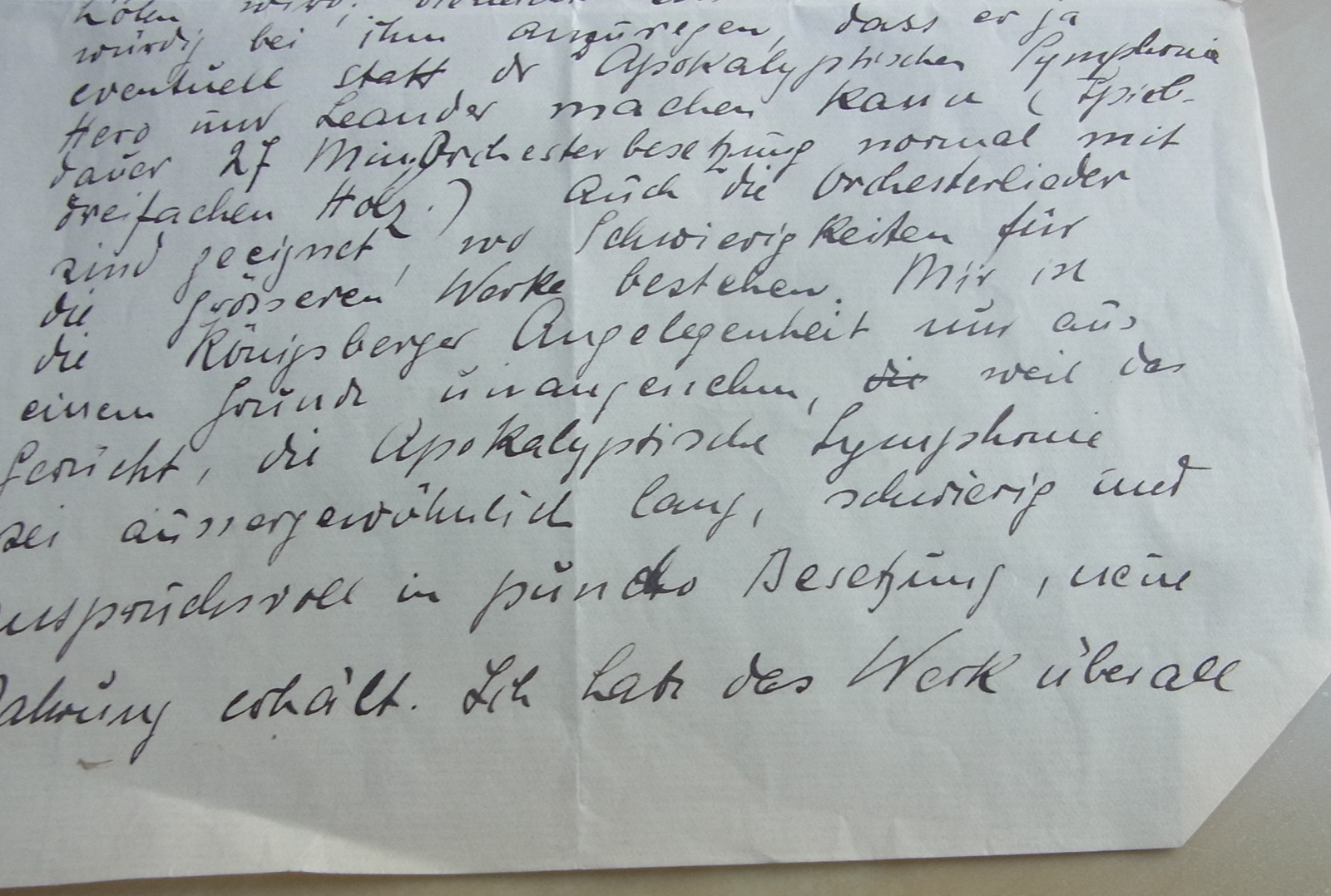
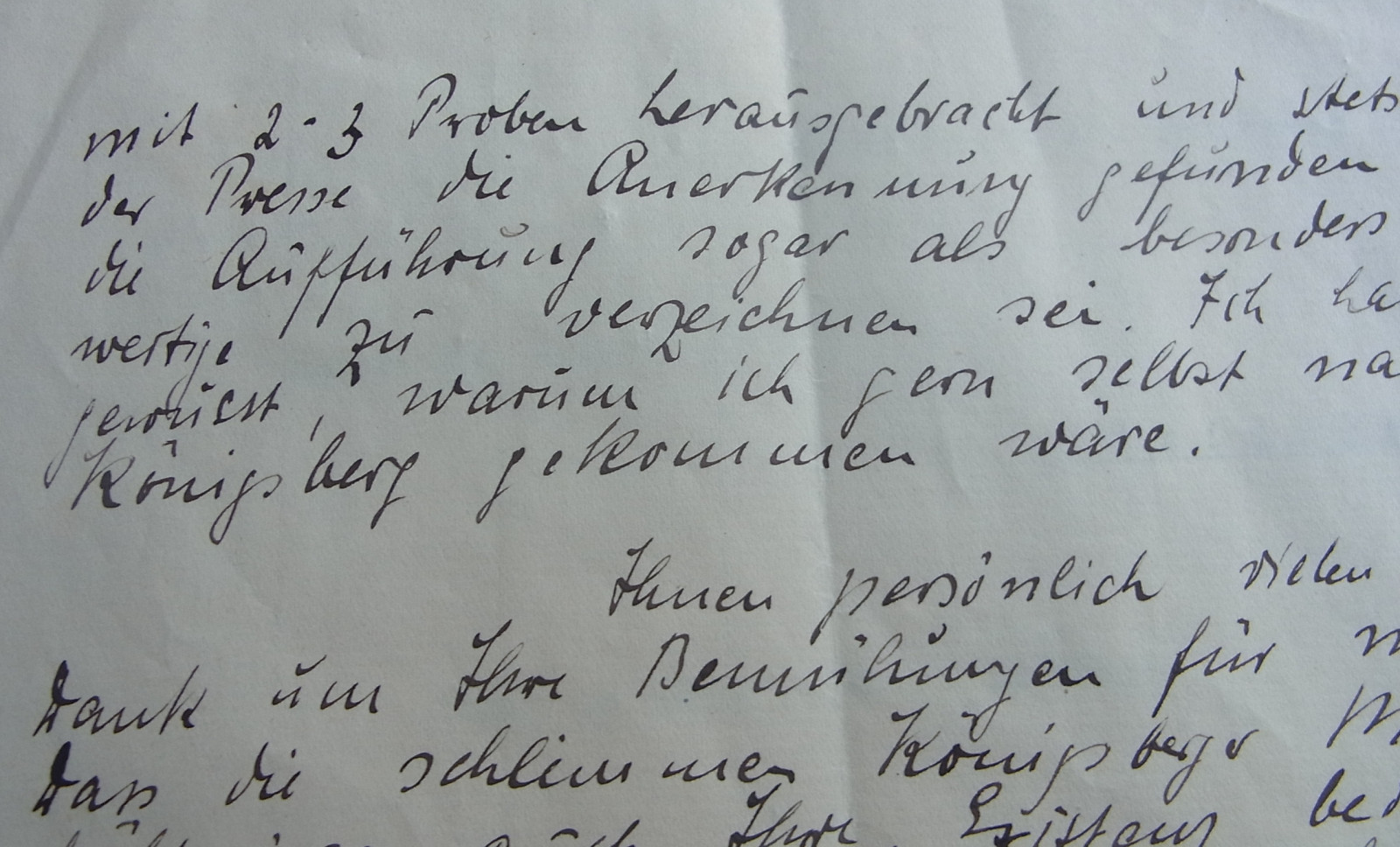
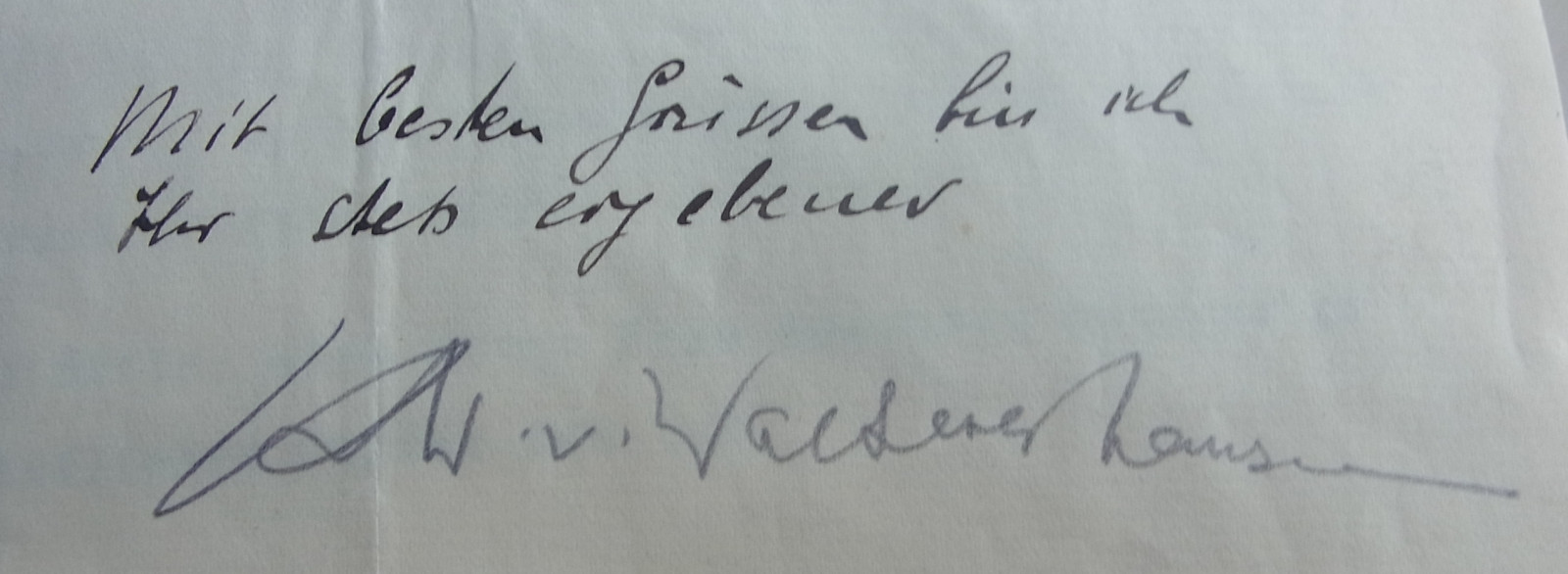

Mobile-friendly galleries at TRIXUM.DE
About Hermann Wolfgang von Waltershausen and Erwin Kroll (source: wikipedia):
Hermann Wolfgang Sartorius Baron von Waltershausen (* 12. October 1882 in Göttingen; † 13. August 1954 in Munich) was a German composer, conductor, music educator and music writer.
Life: Hermann Wolfgang Sartorius von Waltershausen, son of the economist August Sartorius von Waltershausen (1852–1938) and his wife Charlotte née. Freiin von Kapherr, came from a family that goes back to the historian Georg Friedrich Sartorius, who was raised to the hereditary nobility in 1827 as Baron von Waltershausen. Hermann Wolfgang von Waltershausen rarely used the surname part Sartorius throughout his life.
Waltershausen grew up in Strasbourg after his family moved there from Göttingen. He suffered from poor health as a child. As a result of lymphogranulomatosis, his right arm and right leg had to be amputated when he was nine years old. However, he did not give up on his goal of becoming a musician and developed a piano technique with his left hand that, with the help of the pedal, enabled him to almost compensate for the lack of his right hand. His disability did not stop him from later performing as a conductor.
Waltershausen began his musical studies in Strasbourg with Marie-Joseph Erb (1858–1944). From 1901 he lived in Munich, where he continued his education in music theory and composition with Ludwig Thuille until 1907. Between 1905 and 1915 he also studied piano with August Schmid-Lindner. In 1917 he founded a practical seminar for music students, which was followed in 1933 by the founding of a seminar for private music teachers. These initially private events were converted into the state-approved Waltershausen Seminar in 1948. With his seminars, Waltershausen became one of the most influential music educators in Munich. His best-known students include Eugen Jochum, Fritz Büchtger, Ernst Kutzer and Wilhelm Killmayer.
In 1920 Waltershausen was appointed professor and deputy director of the Munich Academy of Music, and in 1923 he was promoted to director and deputy president of the academy. He was also a program consultant for Bayerischer Rundfunk. In 1933 Waltershausen took early retirement and, as a private music teacher, devoted himself mainly to working in his seminars.
In 1927 Waltershausen married the composer Philippine Schick (1893–1970), who had previously been his student for several years. The marriage produced their daughter Lore, born in 1928. In 1932, Philippine Schick divorced her husband because he didn't allow enough freedom for her own artistic work. Waltershausen then married the pianist Caroline Strößner (1900–1974), also one of his students, in 1933. This marriage remained childless.
Hermann Wolfgang von Waltershausen died in 1954 as a result of a stroke. His music education work was continued by his wife Caroline. The composer's estate is kept in the Munich City Library.
Compositional work: The surviving work of Hermann Wolfgang von Waltershausen is relatively small. Some of his compositions were destroyed in the Second World War, as evidenced by the gaps in the series of opus numbers. Stylistically it can be assigned to the late romantic period. Among his contemporaries, Waltershausen particularly valued Hans Pfitzner and Richard Strauss. Like them, he also saw himself in the tradition of Richard Wagner, which is also reflected in the fact that he wrote the libretti for his operas himself.
Waltershausen's early work consists primarily of operas and songs. Particularly noteworthy here is the opera Colonel Chabert, based on the work of the same name by Honoré de Balzac, which became the composer's most successful work after its premiere in 1912 and was able to stay on important stages at home and abroad for several years. In the 1920s, Waltershausen turned to composing large orchestral works, of which the Apocalyptic Symphony and nativity music received particular attention. After completing his last opera The Countess of Tolosa in 1936, the composer ended his artistic work and only wrote a few contrapuntal pieces for study purposes for his students.
After Waltershausen's death, his works were largely forgotten. They have so far been little researched. In March 2010, the Deutsche Oper Berlin presented Waltershausen's musical tragedy Colonel Chabert for discussion with audiences and the press, with great success.
Music literary work: The main focus of the music writer Waltershausen was on the opera genre. In addition to several studies on individual works, he wrote an extensive work on opera dramaturgy, which was never published.
Similar to Hans Pfitzner, Waltershausen also appeared as an opponent of atonal music, which he described in his book about Strauss as an “honest and complete expression of the character destruction of our time”. He also believed that every people had their own musical character that was incompatible with that of other peoples. Accordingly, he showed respect for the music of foreign (Claude Debussy, Giacomo Puccini) and composers of Jewish origin (Gustav Mahler, Franz Schreker), but did not recommend their works for “Germanic” composers to imitate. Although his approach to music certainly had parallels with the later ideas of the National Socialists, Waltershausen did not get along well with them. The increasing Nazi influence also encouraged him to take early retirement in 1933.
In addition to writings on music, Waltershausen also wrote works of fiction, of which only one volume of poems was published.
Honors
1922 Honorary doctorate from the Johann Wolfgang Goethe University in Frankfurt am Main
factories
Compositions
Stage works
(all libretti by the composer)
Else Klapperzehen, musical comedy in 2 acts (1907, premiere Dresden 1909)
Colonel Chabert, musical tragedy in 3 acts based on Honoré de Balzac's Comtesse à deux maris op. 10 (1910, UA Frankfurt/Main 18. January 1912)
Richardis, Romantic opera in 3 acts op. 14 (1914, premiere Karlsruhe 1915)
The Rauhenstein Wedding, opera in 3 acts op. 17 (1918, premiere Karlsruhe 1919)
The Countess of Tolosa, opera in 2 parts or 7 pictures (1932–36, premiere Bayerischer Rundfunk Munich 1958, previously unperformed)
Orchestral works
Apocalyptic Symphony in C minor, Op. 20 (1924)
Hero and Leander, symphonic poem op. 22 (1925; also: Symphony No. 2 E major)
Nativity music for harpsichord and chamber orchestra op. 23 (1926)
Orchestral partita on three sacred songs, op. 24 (1928)
Comedy Overture in C major op. 26 (1930)
Passion and Resurrection Music op. 27 (1932)
Vocal compositions
Two songs for high voice and piano (1913)
Eight songs for high voice and orchestra, op. 11 (1913)
Seven songs, a song circle after Ricarda Huch for high female voice and piano op. 12 (1913)
Three secular songs for high soprano and small orchestra op. 13 (1913)
Cophtic song for baritone and piano op. 15 (1914)
Alkestis, melodrama for speakers, choirs and orchestra, op. 25 (1929)
The Miracles of the July Nights for two-part children's choir and a keyboard instrument (1934)
Piano and chamber music
String Quartet in E minor op. 16 (1915)
Polyphonic Studies op. 21 for piano (1921)
smaller contrapuntal study works (canons, fugues)
Fonts
Musical style theory in individual presentations:
Volume 1, The Magic Flute, an operatic dramaturgical study (1920)
Volume 2, The Siegfried Idyll or the Return to Nature (1920)
Volume 3, Der Freischütz, an essay on musical romanticism (1920)
Volume 4, Orpheus and Eurydice, an operatic dramaturgical study (1923)
Richard Strauss, an attempt (1921)
Music, dramaturgy, education. Collected Essays (1926)
Conductor's Education (1929)
Poems from 1930–1934 (1934)
The Art of Conducting (1942)
Memoirs (unpublished)
Dramaturgy of the opera (unpublished)
several essays for music magazines
8 unpublished dramas
literature
Karl-Robert Danler/Richard Mader: Hermann Wolfgang von Waltershausen. (= Composers in Bavaria 4). Schneider, Tutzing 1984.
Erwin Kroll (*3. February 1886 in Deutsch Eylau, East Prussia; † 7. March 1976 in West Berlin) was a German pianist, composer, writer and music critic. Like his friend Otto Besch, Kroll was an East Prussian composer.
Life: Around 1900 Kroll came to Königsberg i. Pr. and attended the Royal Hufengymnasium with Otto Besch. At the Albertus UniversityHe studied philology and music. With a doctoral thesis on ETA Hoffmann, who has always been revered in Königsberg, he received his Dr. phil. received his doctorate, he went into teaching. In 1919 he turned entirely to music and continued his studies in Munich, which he had begun with Otto Fiebach and Paul Scheinpflug. There he found an important teacher, especially in Hans Pfitzner. He later dedicated a highly acclaimed book to him. In addition to his studies, Kroll was an accompanist at the Munich State Opera and secretary of the Hans Pfitzner Association for German Music, which Thomas Mann had called for to be founded. In 1925 Kroll returned to East Prussia and became music critic for the Hartungsche Zeitung, and from 1930 onwards it was its features editor. Since 1934 he worked in Berlin as a critic and music writer. After the Second World War he headed the music department of the Nordwestdeutscher Rundfunk in Berlin until 1953. With his book, Kroll has created a monument to the (forgotten) importance of Königsberg as a music city.
factories
East Prussian homeland - orchestral work
Violin Sonata in B major
Sonatina in F major
East Prussian dances
The Adebar - fantasy about East Prussian folk tunes for large orchestra
Vocal works and song arrangements
Songs for solo voices and choir songs
Fonts
Music city Koenigsberg
Ernst Theodor Amadeus Hoffmann. Breitkopf & Härtel, Leipzig 1923.
Hans Pfitzner. Three Masks Verlag, Munich 1924 .
The theater. Festschrift for the 25th anniversary of the Dortmund Municipal Theater. The theater, Berlin 1930.
Carl Maria Weber. Athenaion, Potsdam 1934 .
Music city Königsberg. Atlantis, Freiburg i. Br. 1966.
Honors
Order of Merit of the Federal Republic of Germany, Cross of Merit on Ribbon (27. January 1956)
Cultural Prize of the East Prussian State Team (1960)